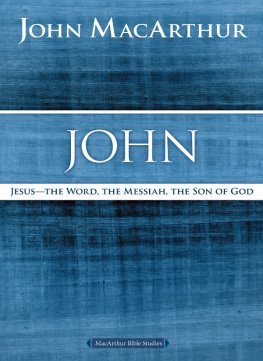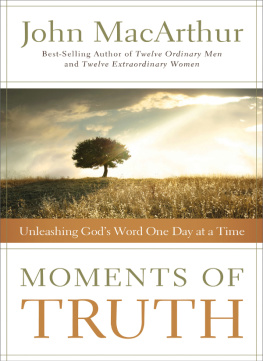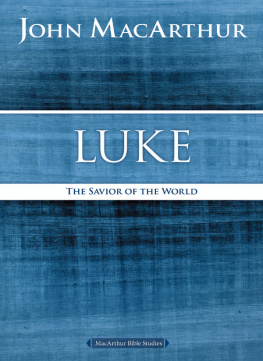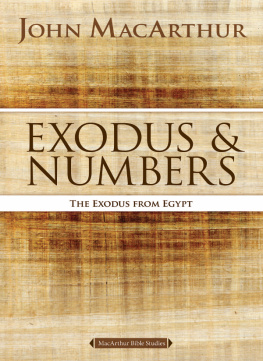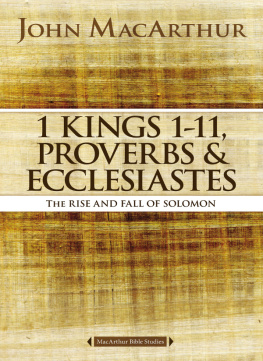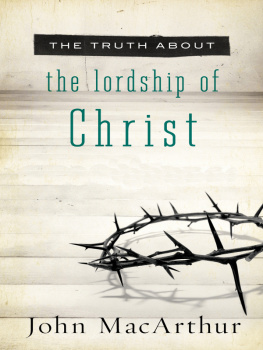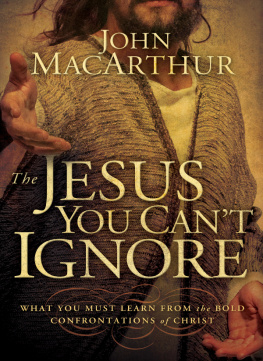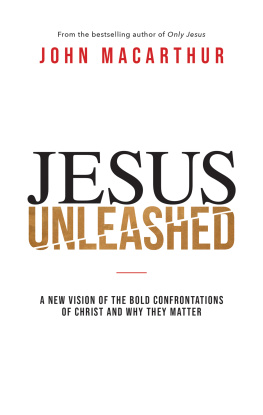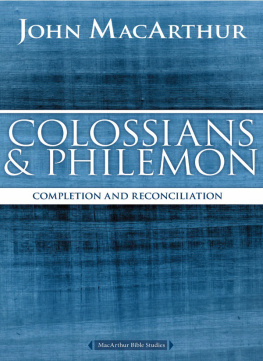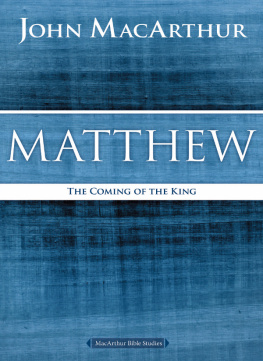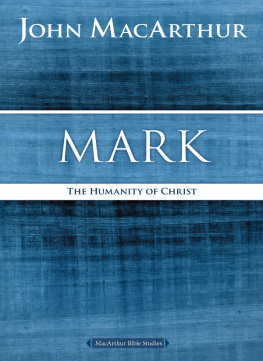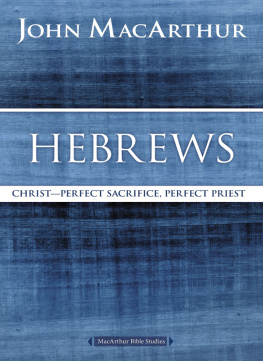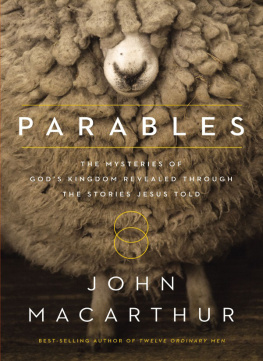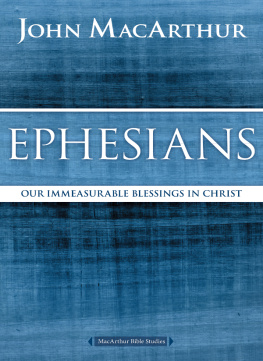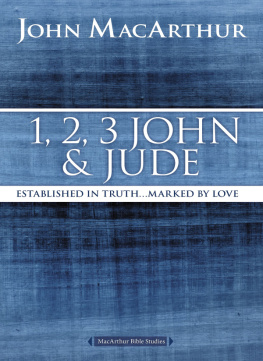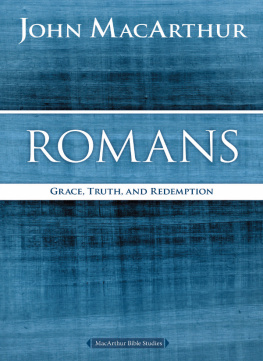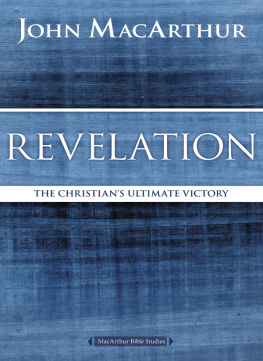JOHN
MACARTHUR BIBLE STUDIES
2007, John F. MacArthur, Jr.
All rights reserved. No portion of this book may be reproduced, stored in a retrieval system, or transmitted in any form or by any meanselectronic, mechanical, photocopy, recording, or any otherexcept for brief quotations in printed reviews, without the prior permission of the publisher.
John MacArthur
Unleashing Gods Truth, One Verse at a Time
Unleashing Gods Truth, One Verse at a Time is a trademark of Grace to You. All rights reserved.
Published in Nashville, Tennessee, by Nelson Books, an imprint of Thomas Nelson. Nelson Books and Thomas Nelson are registered trademarks of HarperCollins Christian Publishing, Inc.
Nelson Books titles may be purchased in bulk for education, business, fundraising, or sales promotional use. For information, please email SpecialMarkets@ThomasNelson.com
Published in association with the literary agency of Wolgemuth & Associates, Inc.
Produced with the assistance of the Livingstone Corporation. Project staff include Jake Barton, Betsy Todt Schmitt, and Andy Culbertson. Project editors: Mary Horner Collins, Amber Rae, and Len Woods
Scripture quotations marked NKJV are taken from the The New King James Version.
1982 by Thomas Nelson, Inc. Used by permission. All rights reserved.
Unleashing Gods Truth, One Verse at a Time is a trademark of Grace to You. All rights reserved.
Keys to the Text material taken from the following sources:
1 Corinthians. MacArthur Commentary Series. 1984, 1996 by John MacArthur. Published by Moody Press.
Galatians. MacArthur Commentary Series. 1987, 1996 by John MacArthur. Published by Moody Press.
Hebrews. MacArthur Commentary Series. 1983, 1996 by John MacArthur. Published by Moody Press.
The MacArthur Study Bible (electronic ed.), John MacArthur, General Editor. 1997 by Word Publishing. All rights reserved. Used by permission.
Nelsons New Illustrated Bible Dictionary, Rev. ed. R. F. Youngblood, F. F. Bruce, R. K. Harrison, editors. 1995 by Thomas Nelson Publishers. Used by permission.
Unleashing Gods Word in Your Life. 2003 by John MacArthur. Published by Thomas Nelson.
Cover Art by Holly Sharp Design
Interior Design and Composition by Joel Bartlett, Livingstone Corporation
ISBN: 978-0-7180-3504-4
ISBN: 978-0-7180-3523-5 (eBook)
15 16 17 18 19 RRD 6 5 4 3 2 1
CONTENTS
The title of the fourth Gospel was identified originally as According to John. Like the others, The Gospel was added later.
AUTHOR AND DATE
Although the authors name does not appear in the Gospel, early church tradition strongly and consistently identified him as the apostle John. The early church father Irenaeus (AD 130200) was a disciple of Polycarp (AD 70160), a disciple of the apostle John, and he testified on Polycarps authority that John had written the Gospel during his residence at Ephesus in Asia Minor when he was advanced in age (Against Heresies 2.22.5; 3.1.1). Subsequent to Irenaeus, all the church fathers assumed John to be the Gospels author. Clement of Alexandria (AD 150215) wrote that John, aware of the facts set forth in the other Gospels and being moved by the Holy Spirit, composed a spiritual Gospel (see Eusebiuss Ecclesiastical History 6.14.7).
Significant internal characteristics of the book reinforce these early church traditions. While the Synoptic Gospels (Matthew, Mark, Luke) identify the apostle John by name approximately twenty times (including parallels), he is not directly mentioned by name in the Gospel of John. Instead, the author prefers to identify himself as the disciple whom Jesus loved (13:23; 19:26; 20:2; 21:7, 20). The absence of any mention of Johns name directly is remarkable when one considers the important part played by other named disciples in this Gospel. Yet, the recurring designation of himself as the disciple whom Jesus loved, a deliberate avoidance by John of his personal name, reflects his humility and celebrates his relation to the Lord Jesus. No mention of Johns name was necessary because the original readers clearly understood that he was the Gospels author. Also, through a process of elimination based primarily on analyzing the material in chapters 20 and 21, this disciple whom Jesus loved narrows down to the apostle John (for example, 21:2, 24). The Gospels author is exacting in mentioning the names of other characters in the book; thus, if the author had been someone other than John the apostle, he would not have omitted Johns name.
The Gospels anonymity strongly reinforces the arguments favoring Johns authorship, for only someone of his well-known and preeminent authority as an apostle would have been able to write a Gospel that differed so markedly in form and substance from the other Gospels and have it receive unanimous acceptance in the early church. In contrast, apocryphal Gospels produced from the mid-second century onward, and falsely ascribed to apostles or other famous persons closely associated with Jesus, were universally rejected by the church.
John and James, his older brother (Acts 12:2), were known as the sons of Zebedee (Matt. 10:24), and Jesus called them Sons of Thunder (Mark 3:17). John was an apostle (Luke 6:1216) and one of the three most intimate associates of Jesus (along with Peter and Jamessee Matthew 17:1; 26:37), being an eyewitness to and participant in Jesus earthly ministry (1 John 1:14). After Christs ascension, John became a pillar in the Jerusalem church (Gal. 2:9). He ministered with Peter (Acts 3:1; 4:13; 8:14) until he went to Ephesus (tradition says before the destruction of Jerusalem), from where he wrote this Gospel and from where the Romans exiled him to Patmos (Rev. 1:9). Besides the Gospel that bears his name, John also authored 1 John, 2 John, 3 John, and Revelation (Rev. 1:1).
Because the writings of some church fathers indicate that John was actively writing in his old age and that he was already aware of the Synoptic Gospels, many date the Gospel sometime after the synoptics composition, but prior to Johns writing of 1 John, 2 John, 3 John, and Revelation. John wrote his Gospel around AD 8090, about fifty years after witnessing Jesus earthly ministry.
BACKGROUND AND SETTING
Strategic to Johns background and setting is the fact that, according to tradition, John was aware of the Synoptic Gospels. Apparently, he wrote his Gospel in order to make a unique contribution to the record of the Lords life (a spiritual Gospel) and, in part, to be supplementary as well as complementary to Matthew, Mark, and Luke. The Gospels unique characteristics reinforce this purpose.
First, John supplied a large amount of unique material not recorded in the other Gospels. Second, he often supplied information that helps the understanding of the events in the Synoptics. For example, while the Synoptics begin with Jesus ministry in Galilee, they imply that Jesus had a ministry prior to that (for example, Matt. 4:12; Mark 1:14). John supplies the answer with information on Jesus prior ministry in Judea (chapter 3) and Samaria (chapter 4). In Mark 6:45, after the feeding of the five thousand, Jesus compelled His disciples to cross the Sea of Galilee to Bethsaida. John recorded the reason: The people were about to make Jesus king because of His miraculous multiplying of food, and He was avoiding their ill-motivated efforts (John 6:26).
Third, John is the most theological of the Gospels, containing, for example, a heavily theological prologue (1:118), larger amounts of didactic and discourse material in proportion to narrative (for example, 3:1317), and the largest amount of teaching on the Holy Spirit (for example, 14:1617, 26; 16:714). Although John was aware of the Synoptics and fashioned his Gospel with them in mind, he did not depend upon them for information. Rather, under the inspiration of the Holy Spirit, he utilized his own memory as an eyewitness in composing the Gospel (1:14; 19:35; 21:24). Johns Gospel is the only one of the four to contain a precise statement regarding the authors purpose (20:3031). He declares, These are written that you may believe that Jesus is the Christ, the Son of God, and that believing you may have life in His name (20:31). Thus John had two primary purposes: evangelistic and apologetic. Reinforcing the evangelistic purpose is the fact that the word believe occurs approximately one hundred times in the Gospel (the Synoptics use the term less than half as much). John composed his Gospel to provide reasons for saving faith and, as a result, to assure readers that they would receive the divine gift of eternal life (1:12).
Next page
